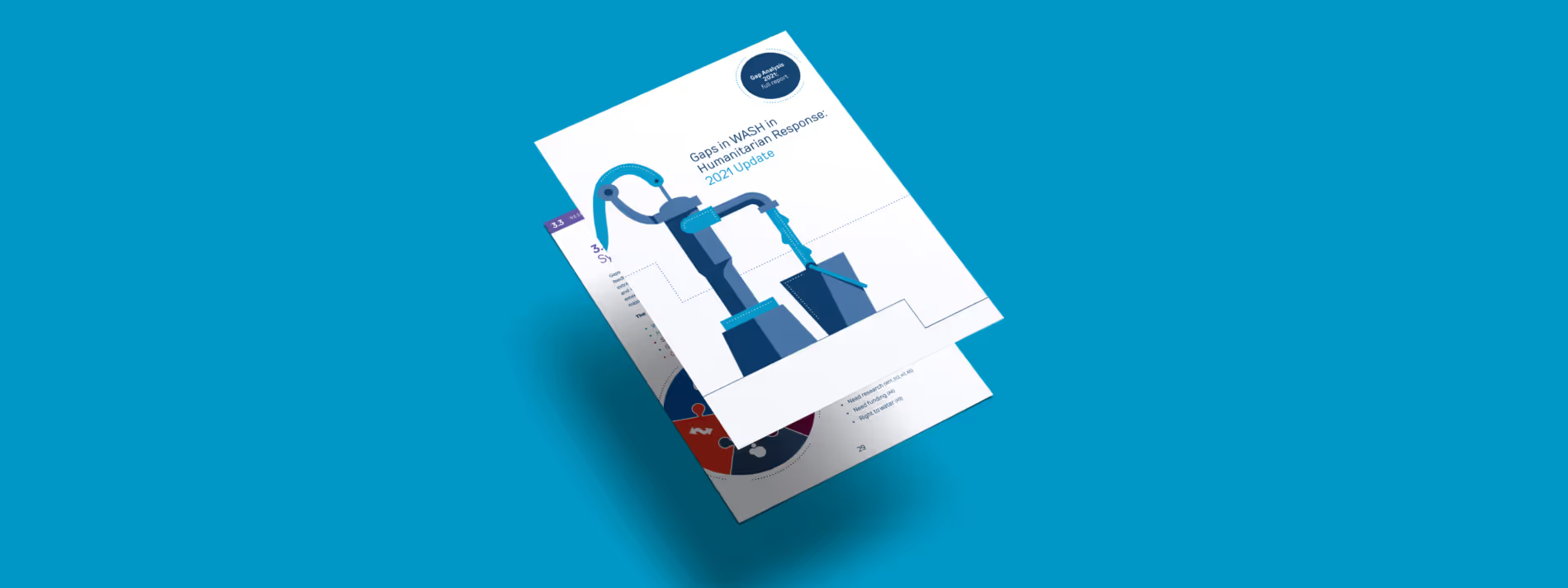Gaps in WASH in Humanitarian Response: 2021 Update

With humanitarian emergencies occurring at increasing rates and affecting a growing number of people, evidence-based strategies and new solutions - including in water, sanitation, and hygiene (WASH) – are vital to ensure people have their essential needs met, can live in dignity and are protected from WASH-related diseases.
‘Gaps in WASH in Humanitarian Response: 2021 Update’ reveals the most pressing WASH challenges facing communities affected by crises worldwide.
This gap analysis is informed by the most comprehensive global WASH data collection of its kind, with more than 1,700 people affected by crisis sharing their views and experiences along with almost 700 in-country WASH practitioners. In addition to this, a survey was conducted with 246 global WASH practitioners and a review of 614 academic articles and grey literature publications was completed.
The gap analysis identifies the priority gaps in humanitarian WASH systems and responses that are limiting the sector’s potential to meet essential needs, minimise WASH-related disease, restore life with dignity to people experiencing emergencies and strengthen their resilience.
We hope it will help set priorities for future WASH research, innovation, coordination and delivery, prompting stakeholders to further explore and seek to understand the root causes of the major gaps experienced by people affected by crisis.
Collaborative effort is now required for WASH actors to better understand why these gaps exist and to explore where more attention and investment needs to be focused. Ultimately, we hope that the gap analysis will lead to the development of new evidence, solutions and approaches to ensure that the gaps are addressed.
The 2021 Gap Analysis package consists of four interlinked reports:
- The Gap Analysis main research report was produced by Tufts University with support from Elrha, Oxfam, the Global WASH Cluster (GWC) and Cranfield University. It outlines the methodology and results, analyses findings, reports the main trends and offers a short discussion of implications and limitations.
- The addendum ‘Summary and discussion of results’ is a short provocation paper by Oxfam, GWC and Elrha that discusses some of the key findings of the Gap Analysis and aims to help the reader consider how they may respond to the findings.
- The 'Gap Analysis Manuscript' is an academic, peer-reviewed paper by Tufts University that sets out the methodology and findings. It is forthcoming (pending peer review) and a link will be shared on this page when the paper is published.
- The 'Gap Analysis Database' contains the complete dataset from the Gap Analysis research, coded and filtered to make it easily searchable. All data is anonymised and can't be traced back to any individuals. The database can be freely downloaded and individuals taking part in the research have consented to the data being used for any purposes relating to i) identifying WASH gaps that exist in humanitarian response globally and ii) determine areas for improvement and innovation within WASH in humanitarian settings around the world.
[.slimline-cta-box][.slimline-cta_heading]We want to hear from you![.slimline-cta_heading][.slimline-cta_paragraph]If you have any questions about the 2021 WASH Gap Analysis please get in touch with us via [email protected].[.slimline-cta_paragraph][.slimline-cta-box]
The 2021 Gap Analysis was commissioned and funded by Elrha’s Humanitarian Innovation Fund, in collaboration with the GWC and delivered by Oxfam, Tufts University, Cranfield University and University of Leeds. Oxfam contributed additional in-kind match funding in the form of staff time. All partners, except Tufts University, actively contributed to the development of the methodology of the project. Tufts carried out an independent analysis of the data. Additionally, a Review Group supported the project by providing technical assistance. This work was made possible with funding and support from the UK Foreign Commonwealth and Development Office (FCDO) and the Netherlands Ministry of Foreign Affairs (MFA).